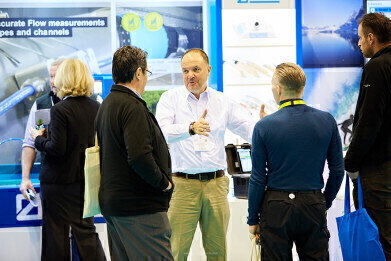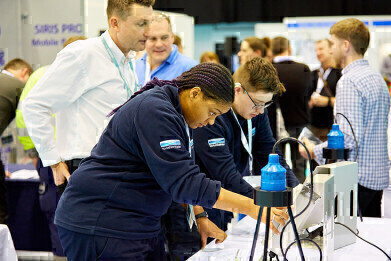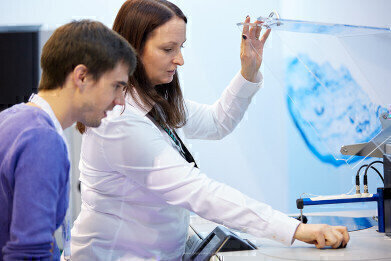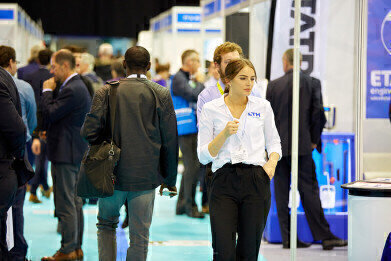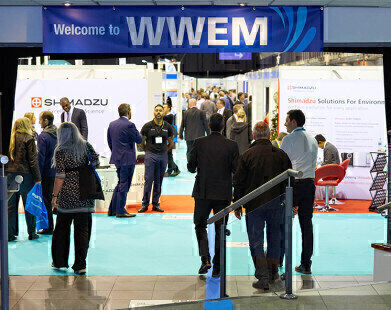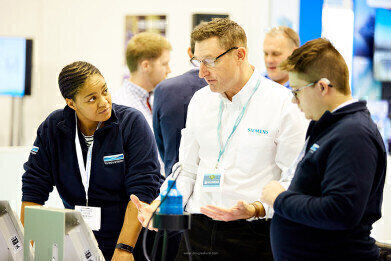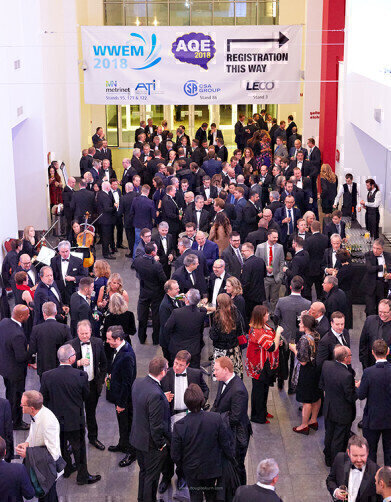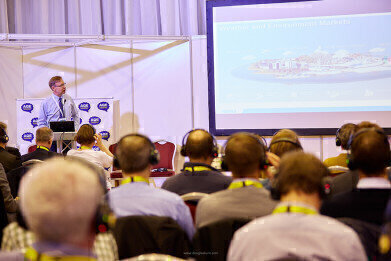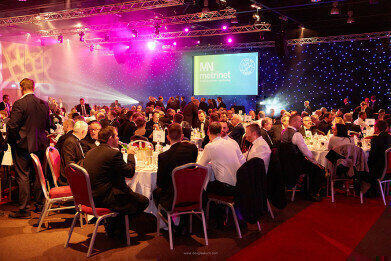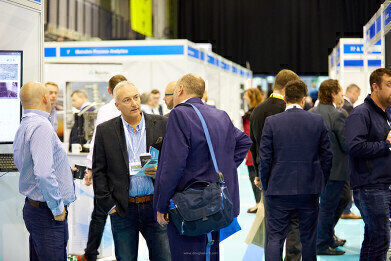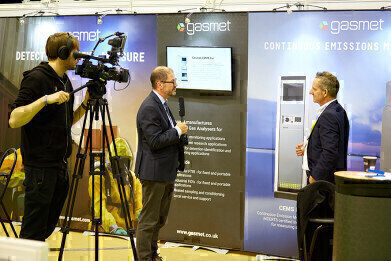Environmental Laboratory
Environmental events LIVE again in 2022!
Aug 24 2022
Following last year’s hugely successful virtual events, the organisers of AQE and WWEM are delighted to announce that the 2022 events will take place live at the Telford International Centre on 12th and 13th October. Both events cover regulations, standards, process control, pollution prevention, test methods and monitoring, with AQE, the Air Quality & Emissions show, addressing outdoor and indoor air quality, as well as industrial emissions, and WWEM focusing on Water Wastewater and Environmental Monitoring in both process water and natural water resources.
“We are absolutely delighted to be able to return to live events again,” says organiser Marcus Pattison. “Last year’s virtual events enabled a broader group of people to access the presentations, but the pandemic prevented all of us from exploiting the advantages of face-to-face meetings. As focused events, WWEM and AQE therefore offer everyone the opportunity to meet a lot of key people in a short space of time, whilst accessing an enormous amount of the latest information.”
Both of the AQE and WWEM conferences are supported by a comprehensive range of seminars, and two major international exhibitions featuring most of the world’s leading suppliers of environmental monitoring equipment, analytical testing instrumentation and support services.
Registration for both AQE and WWEM is free and available from ILM Exhibitions. By registering prior to the event, visitors will be entitled to free parking, free refreshments and complementary access to both events.
AQE 2022
The two main components of AQE are air quality (indoor and outdoor), and industrial emissions. The air quality programme has been configured by Jim Mills, a well-known figure in the sector and now and independent consultant with Scotswolds Ltd. Presentation titles, abstracts and author details are published on the AQE website. However, the main themes of the air quality sessions will cover four key issues, which can be summarised as follows:
1. Regulation and Policy
Speakers from government/regulators will summarise the implications of the Environment Act 2021 with regard to ambient air quality, explaining the targets and timelines that have been specified. For example, the Act establishes a legally binding duty to bring forward at least two new air quality targets in secondary legislation by 31 October 2022. The proposed targets relate to PM2.5 with a 2040 objective, which is a concern for many stakeholders. These issues will be addressed by subsequent speakers from philanthropic organisations which are engaged in air quality matters by funding research, undertaking monitoring and other initiatives, whilst also lobbying policy makers, seeking to improve environmental legislation and hold the government to account.
The UK’s Air Quality Expert Group (AQEG), provides advice to the UK government, and one of their members will provide an update on current knowledge on air pollution in relation to concentrations, emission sources and the characteristics of air pollutants in the UK.
The final presentation of this session will be given by a speaker from NPL, the UK’s National Physical Laboratory. They will describe a new state-of-the-art facility for testing sensor technologies, and outline the latest work on the standards and methods that underpin air quality science.
2. Measurement technology
This session will provide the latest information on developments in the techniques and technologies employed on the measurement of air pollution. This will include a report from QUANT programme, which has conducted a real-world open and traceable assessment of low-cost sensors and sensor networks, and their calibration, in order to better understand their performance.
One of the speakers will focus on the measurement of Black Carbon; a pollutant which has a significant impact on both air quality and climate change. This presentation will outline the latest advances in small sensor technology for Black Carbon measurements.
During the COP26 Conference a monitoring project was undertaken in Glasgow using small sensor technology including sensors for carbon dioxide. The results of this trial will be presented, with an explanation of how CO2 measurements can contribute to source attribution and to the calculation of emissions indices.
This section will also include news of a potential game-changing project to host air quality monitoring networks onto existing cellular communications network infrastructure.
3. Joined-up thinking
In the past, there have been concerns that monitoring and modelling have been regarded as almost separate methods for the assessment of air pollution, but in this session, speakers will outline the case for greater integration. Monitoring should be used to calibrate and verify modelling predictions, and recent advances in low-cost sensors mean that greater spatial density of monitors can be deployed to enhance the reliability and granularity of modelling predictions.
In the general media and in the minds of the public, air quality and climate change are frequently represented as the same environmental problem. However, not all air pollutants have a greenhouse gas effect, and greenhouse gases are not usually toxic. Nevertheless, local air quality strategy is often separate to local climate change strategy. This might be because they may have separate budgets in both central government and local authorities, but this session will explain why both strategies should be combined. For local authorities, the greatest impacts on both air quality and climate change come from planning and development, so it is vital that these issues are addressed in the planning process.
4. Indoor Air Quality (IAQ)
Most people spend more time indoors than outdoors, so whilst it is important to tackle outdoor pollution, it is even more important to protect the quality of indoor air. When people meet indoors, carbon dioxide levels increase, and it is well known that this can cause drowsiness and harm the performance of office workers and schoolchildren for example. However, the Covid pandemic further highlighted the importance of ventilation because the concentration of airborne infectious aerosols also increases in populated rooms with inadequate ventilation. Speakers will therefore describe a government pilot study in which CO2 and particulate sensors are being used to monitor ventilation in schools.
With energy costs soaring, the challenge will be to implement effective ventilation, whilst maintaining comfortable temperatures and minimising power consumption. The final presentations will be given by abatement and ventilation specialists who will explain how these IAQ issues can be addressed, as cost-effectively as possible.
AQE – emissions monitoring and control
The regulations, standards and methods relating to the measurement of industrial emissions have been a key feature of all AQE events and the MCERTS events before that. AQE 2022 will continue to address this core issue with an additional focus on the role of monitoring in the fight against climate change.
On the first day of AQE 2022, a speaker from the Environment Agency will set the scene with a presentation on relevant regulations, after which the Environmental Services Association (ESA) will outline a strategy for the recycling and waste sector to meet Net Zero. Both of these presentations will be given with particular reference to the monitoring requirements.
One of the speakers will also address the challenges of monitoring biogenic and fossil carbon emissions. Global initiatives are under way to reduce the use of fossil fuels, which has resulted in an increase in the use of fuels of biogenic origin as a replacement. Examples of biogenic carbon emissions include those from: the combustion of biogas from landfill, wastewater treatment, or manure management processes; the combustion of the biological fraction of municipal solid waste or biosolids; and emissions derived from the combustion of biological material, including forest-derived and agriculture-derived feedstocks. The combustion of fuels with mixed and variable fossil and biogenic components presents a monitoring challenge because it is necessary to discriminate between the biogenic CO2 within the flue gas and the fossil CO2.
Carbon capture represents an important opportunity to lower carbon emissions, however, amine solvents are used in some carbon capture processes, which can react to form new compounds within the plant’s emissions. For example, nitrosamines and nitramines are possible carcinogens but the environmental toxicity of amines is not well understood, and they are challenging to sample and analyse. Rod Robinson from NPL will therefore deliver a presentation summarising current research projects and the requirements for monitoring amine emissions.
There will also be presentations on continuous sampling, with help and guidance from an operator’s perspective.
The second day of the AQE emissions monitoring programme will focus on data acquisition, handling and reporting. The first presentation, by David Graham, a technical consultant with Uniper, will provide an overview of EN 17255, the standard for Stationary Source Emissions – Data acquisition and handling systems. This standard is comprised of four parts, and there will be separate presentations on each part.
Part 1 specifies the requirements for the handling and reporting of data.
Part 2 specifies the requirements for data acquisition and handling systems.
Part 3 specifies the requirements for the performance test of data acquisition and handling systems.
Part 4 is the draft specification of requirements for the installation and on-going quality assurance and quality control of data acquisition and handling systems.
The final session will be a panel discussion, addressing all or any of the subjects covered by the emissions monitoring programme.
WWEM 2022
In common with previous WWEM events, this year’s presentations will provide an update on the latest regulatory requirements, standards and methods for testing and monitoring water, in all its forms. In addition, topical issues will be addressed such as river water quality and CSOs. However, the overall objective for 2022 will be to focus on learning and development. “There will be over 100 hours of free content available,” explains Oliver Grievson, who helped to organise the programme. “We have involved several key professional organisations such as CIWEM, the IES and the IMC to ensure that the content is relevant and appropriate for professional development. WWEM 2022 therefore represents a great opportunity for everyone from the newest apprentices to the most experienced industry experts.” Oliver is the founder of WIPAC (Water Industry Process Automation & Control), the LinkedIn Group, which currently has over 11,000 members.
Pollution Forum
The WWEM organisers are delighted to announce that Phillip Dunne MP, Chair of the Environment Audit Committee (EAC), has agreed to deliver the keynote presentation on the second day of WWEM 2022, subject of course to diary changes that sometimes affect MPs. The EAC has recently completed an investigation into river water quality and this will be summarised in the presentation. This speaker will also describe Section 82 of the Environment Act 2021 which states that a sewerage undertaker must monitor (DO, pH, turbidity & ammonia) upstream and downstream of an asset where water quality is potentially affected by discharges from storm overflows.
This issue is highly topical, given the growing public concern with the effects of CSOs, particularly since the rise in popularity of open water swimming. Some of the WWEM exhibitors presented evidence to the EAC on river monitoring, including Meteor Communications, who provided the MPs with a live demonstration of real-time remote water quality monitoring at a variety of UK rivers.
Effluent and river water quality will also be addressed by speakers from the Environment Agency, CIWEM, United Utilities and Nick Mills from the Southern Water Storm Overflow Taskforce. In the afternoon, the Rivers Trust will host a major session focusing on citizen science; looking at the ways in which any interested individuals can help improve the spatial and temporal monitoring of the UK’s rivers.
Flow Forum
Running on the first day of WWEM, the Flow Forum will feature speakers from the Environment Agency, Thames Water, Morrison Water Services and the Coal Authority, with presentations covering the latest requirements and practical insights for installers and operators of flow monitoring equipment.
Digital Zone
Over the first day of WWEM 2022, BIM4Water will run a series of presentations and workshops designed to share knowledge and enhance skills in the digital transformation of the water sector through better information management. BIM4Water is a cross industry not-for-profit group which is open to all organisations involved in the management and delivery of water and wastewater assets and services.
A series of SWAN (Smart Water Networks Forum) workshops will bring together key players to collaborate and accelerate the use of data-driven solutions in water and wastewater networks. Visitors to this workshop will: gain insights on the most pressing, water service challenges; learn about the latest, integrated smart water and wastewater solutions; hear real-life water company case studies and engage with water company and industry leaders.
The second day of the Digital Zone will see presentations by technology experts from within the supply chain. For example, HACH will explain how digital developments in sensor technology, communications and control software are helping to lower costs and improve efficiency in wastewater treatment processes using real-time control. Siemens will discuss the use of AI in spill detection, and Z-Tech will describe instrumentation-based asset management.
Communications Zone
As a vital component of digital transformation, developments in communications technology are the enablers of the advantages that are now being realised, and speakers will describe the latest advances in a range of communications technologies. Vodafone will explain how narrowband IoT (NB-IoT), a wireless communications standard, is ideal for devices that handle relatively small amounts of data with a low bandwidth and a low power requirement. Ground Control will describe the application of satellite communications, Siemens will explain the role of EDGE in IoT, and advances in radio communications will be described by Radio Data Networks. The communications presentations will be repeated on both days of WWEM 2022.
Apprentice Competition
The Instrumentation Apprentice Competition is open to teams of two apprentices, which are currently at NVQ level 3 or are within two years of qualifying. The competition is split into three rounds with the first round setting the apprentices scenarios to solve by engaging with the supply chain so that practical and technical issues can be addressed.
The second practical round involves tests set by some of the sponsors, and the third round is a quick-fire quiz, testing everything that the teams have learned throughout the day. The competition is free to enter, with teams generally coming from utilities and service providers. All competitors are invited to the Gala Dinner (12th Oct) and receive free membership of the Institute of Measurement & Control.
Water Dragons
WWEM has partnered with the Future Water Association to run a ‘Water Dragons’ heat on 12th October, during the conference/exhibition. Water Dragons provides a unique opportunity for companies to pitch product, service or process innovations to a panel of senior water company executives and industry specialists. Launched in 2008, Water Dragons is the water sector’s version of the BBC’s Dragon’s Den. Instead of competing for funding, participants will be seeking to raise their profile, enhance their credibility and influence some of the industry’s key decision makers.
“The WWEM events are vitally important for anyone involved with process control in the water and wastewater industry, so we are thrilled to be able to run a Water Dragons heat during WWEM 2022,” explains Future Water Association CEO, Paul Horton. “By partnering with WWEM we will provide our participants with a wider audience so that they can gain even greater benefits from pitching to the Water Dragons.”
During the heat, each entrant will have 8 minutes within which to describe their innovation and the challenge/problem being tackled. They will also need to describe the market for their product or service, and explain what differentiates their innovation from others.
WWEM 2022 & AQE 2022 – Register NOW!
Summarising the plans for these two events, Marcus Pattison says: “An enormous amount of effort has gone into the preparation for 12/13th October, and I would like to express my sincere gratitude to everyone that has helped. That includes all of the session organisers and chairs, as well as everyone that has agreed to speak. I would also like to thank all of the exhibitors that will be coming to Telford from all over the world.
“It is tremendously exciting to be able to run a physical event again – everyone keeps telling me that they can’t wait to meet again! This year the volume of available content is incredible – I would urge everyone to plan their trip very carefully so that they can jump in and out of their sessions of most relevance, to maximise the benefit of their visit.
“Can I also ask everyone to REGISTER NOW at ilmexhibitions.com – it’s free and only takes a few seconds. Registered visitors will be entitled to free parking, free entry, free lunch and refreshments, but most importantly, they will be provided with free access to all of the presentations (both AQE and WWEM), both exhibitions and all of the seminars and workshops that will take place!
“Telford benefits from easy access and the International Centre has hotels on site, so that visitors can stay for both days. So, as you can probably tell, we are really excited about this year’s events and we can’t wait to see everyone in Telford!”
Digital Edition
Asian Environmental Technology 27.2 - April/May 2023
May 2023
In This Edition Business News - Celebrating The Life Of A Gas Measurement Industry Icon - A New Home For Gas Sensor Specialists - Envea Completes The Acquisition Of Hycontrol Ltd Environ...
View all digital editions
Events
Jul 02 2023 Albena, Bulgaria
Jul 04 2023 Cardiff, UK
Jul 05 2023 Johannesburg, South Africa
Jul 11 2023 Shanghai, China
Jul 11 2023 Lagos, Nigeria
